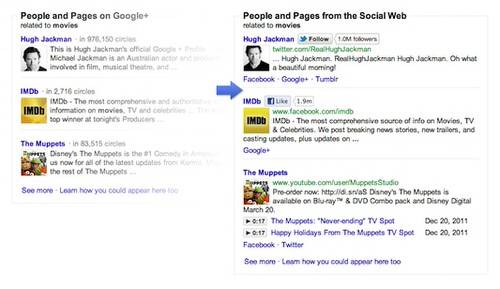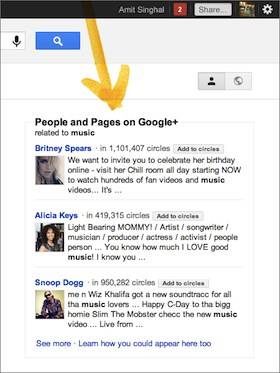When Google shipped its Search, plus Your World update earlier this month, it turned out better than expected. Google left users the ability to click back and forth between personal and global modes or opt out altogether. Google’s personal search draws in the user’s Google+ relationships to tailor the results. When it launched, Google took the position that other social networks were welcome to participate, they just had to make a deal.

Google does make some effort to identify content from other networks. But some SPYW features only highlight Google+ material, even when other services are more relevant. If Google favors its own product over a better result, users get the short end of the stick. Some engineers from Facebook, Twitter and Myspace have built a browser extension called Focus on the User to prove the point. But what about Google+ users? For them, Google+ results are the better result. Arguably, Google should cater to them, as users of its service.

Google’s Choice: Help Google+ Users Or Help Others
When a large-scale Web service puts an opt-out switch on a new feature, it’s because its designers believe users will like the feature. If the Google+ comments on our stories are any indication, Google+ users like this personalized search just fine.
But Google and its fans have two other use cases to consider. People who would rather have their personal website, Twitter or Facebook profile appear above Google+ are not well-served by Google anymore, nor are people whose social graphs exist on networks other than Google+.
Google has no obligation to these users. It can arrange its services however it wants. They’re free, after all, as the underpinnings of Google’s ad business. But Google itself has enough information to determine when a Facebook profile would be more relevant than a Google+ profile in its “People and Pages” box. It can tell when a Facebook profile has more subscribers and activity than a Google+ page.
The “People and Pages” box has hard-coded instructions to display Google+ instead. That might make Google less useful to people who don’t use Google+, but it’s more useful for those who do.
The effects of the Focus on the User plug-in

Focus On The User, Not The Service
The people who built Focus on the User used Google’s own search signals to route around the Google+ integration when other results are more relevant. Larry Page returns a Google+ result, but Mark Zuckerberg returns a Facebook result. Danny Sullivan at Search Engine Land extensively tested the Focus on the User plug-in, and it worked like a charm; the profiles with the most activity and information came up first, whether they’re from Google+ or not.
John Battelle has had some interesting chats with Facebook’s Director of Product, Blake Ross, one of the developers of Focus on the User. The tool has gone through several phases, the first of which was just to remove all references to Google+. The tool released today is more thoughtful than that, as Battelle points out. It produces the most relevant result as measured by links, references from many other networks, and overall activity. You can read the code right on the website to see how it works.
Google+ Users Want Google+ Results
According to the Focus on the User developers, Google search should provide the most relevant result without assuming anything about the user’s preferred social network. That way, the result that best represents the person or topic being searched for will be at the top. By this definition, “Search, plus Your World” should represent the world most accurately.

But does that focus on the Google+ user? For those who want Google+ to be their social network, the best result for their “world” might be the Google+ page, even if the owner barely uses it or just re-posts things from Facebook or Twitter. The Google+ user wants Google+ results. Shouldn’t Google focus on the user of its own service?
The best solution to social search would be one that lets the search user decide what network(s) to prefer. To the extent that a social search engine doesn’t prefer the user’s own networks, it’s not social search; it’s just search. Maybe those results are more relevant, and maybe social search creates a filter bubble. But for those who want Google+ to be their “world,” Google’s social search works.
If Google+ social search is not for you, try Focus on the User and let us know how it goes.
Do you want personalized search results? How would social search work best for you? Sound off in the comments.










